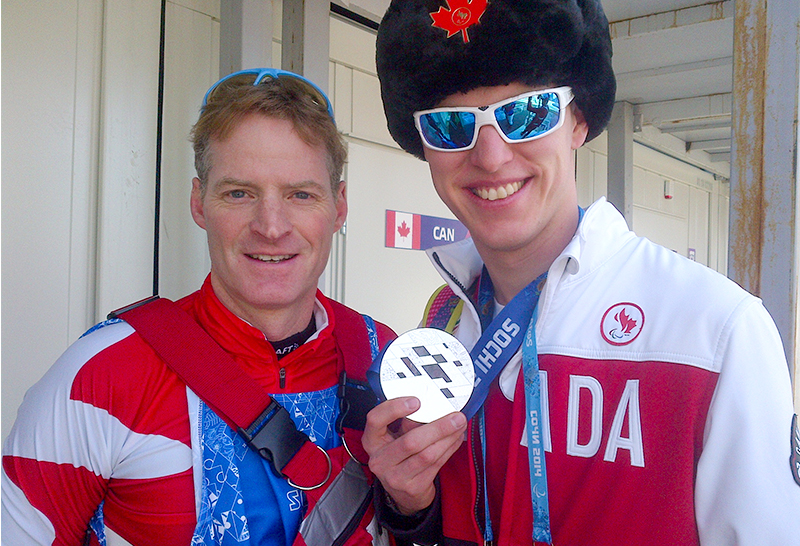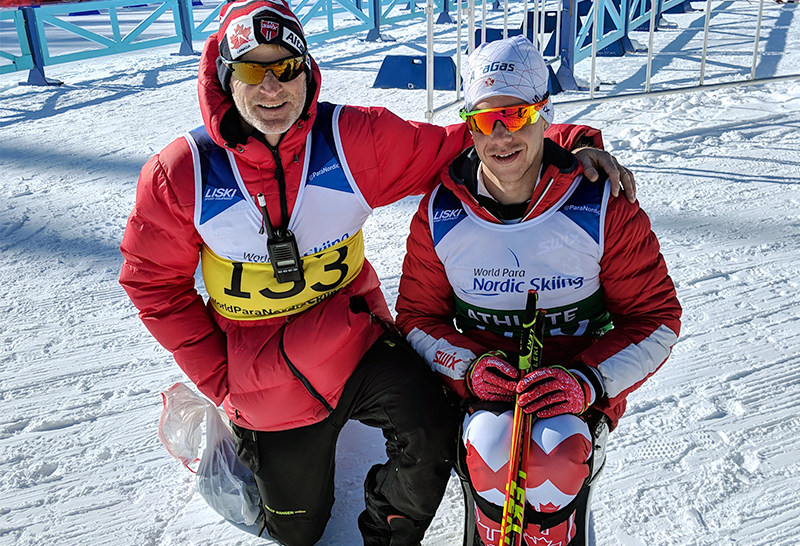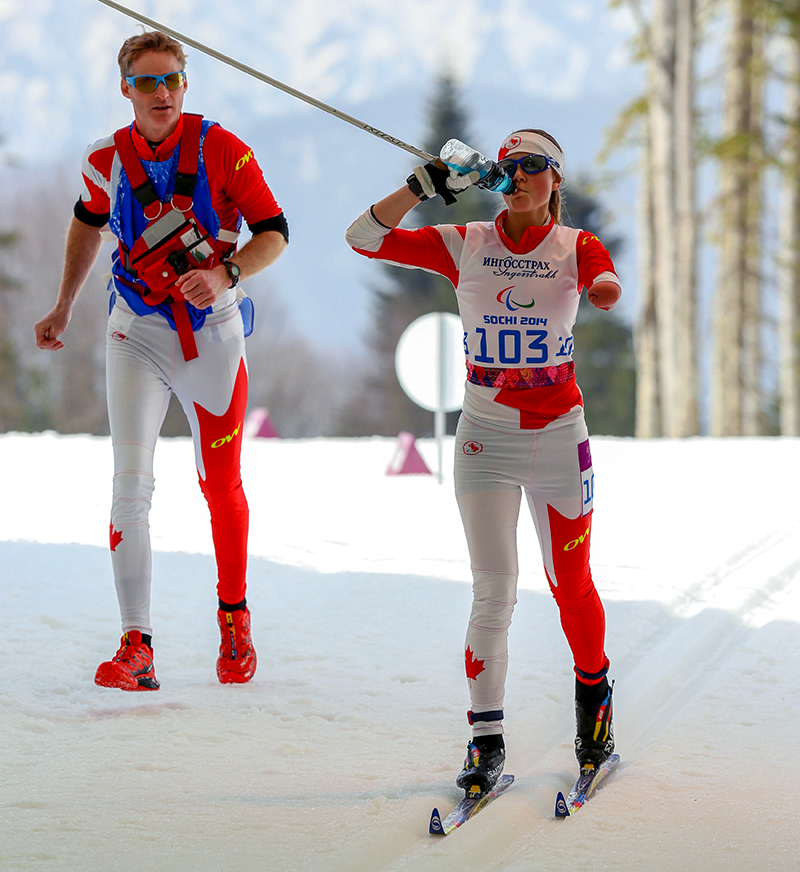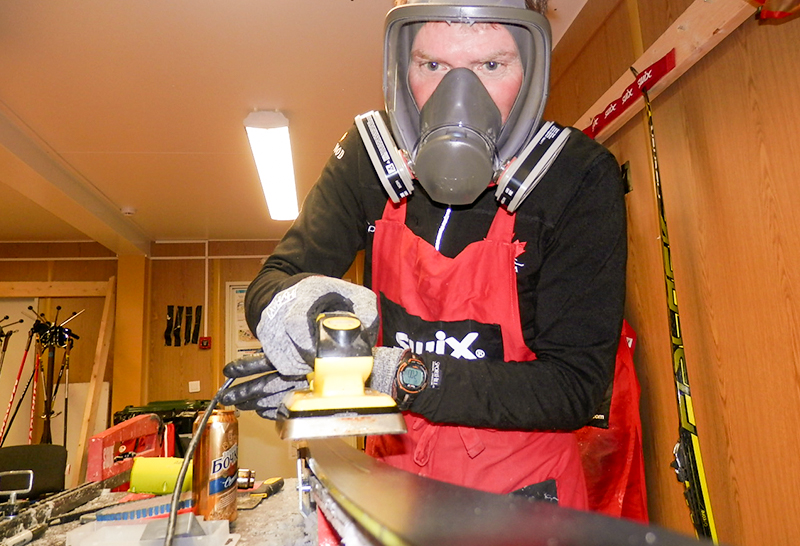
Jefferson Hagen
MacEwan Athletics
EDMONTON – When Mark Arendz hit the top of the podium at the Pyeongchang Paralympics, winning the 15K standing biathlon competition – among a record six medals he claimed in 2018 – the smile of satisfaction on Bjorn Taylor's face told the story.
Their team had done it.
Their athlete was the best in the world.
Three decades earlier, Taylor was a cross-country skiing student-athlete for the MacEwan Griffins, but in the years since, he's become a key figure behind the scenes for Canada's powerhouse Para-Nordic team and is currently at his fifth Paralympics as a biathlon coach and wax technician.
He quickly recalls the day Arendz's journey began with Team Canada.
"When I was in Canmore and we were working on development, we had no new athletes and I knew about this kid in P.E.I. doing cadets and shooting and he skied a bit. So, I called his family up out of the blue right after Torino (2006) and said, 'hey, there's a ski development event in Norway and we want to send your son there.'
"His mom said, 'WHAT, he's 16 years old, you've never even met this boy, how could you do this?'
"But we did it and I had some good reports back. So, we got him in the program, he ended up moving to Alberta and was living with one of our coaches for a while.
"Long story short, I've known Mark since he started with the program in 2006. So, when he won his gold medal in Pyeongchang, that was significant.
"I think we all shed a few tears then."
The Hartsville, P.E.I. native recently won another Paralympic gold, claiming the men's standing 10K biathlon in Beijing earlier this week for the 10th Paralympic medal of his career.
Said Taylor in a January interview: "Meeting him when he was a gangly 15-year-old who was new to the program – he'd done some biathlon with cadets before but not really structured – sending him off to this international development event in Norway sight unseen and then working with him at various events in Canada for many years … to see him hit the top of the podium was very memorable for me."
 Bjorn Taylor, left, poses with Mark Arendz and a Paralympic silver medal he won at the 2014 Sochi Games. It's one of 10 Paralympic Games medals that Arendz has won over his career (Courtesy, Bjorn Taylor).
Bjorn Taylor, left, poses with Mark Arendz and a Paralympic silver medal he won at the 2014 Sochi Games. It's one of 10 Paralympic Games medals that Arendz has won over his career (Courtesy, Bjorn Taylor).
Taylor also works as an international classifier for the Paralympic movement, which means he travels around the world to various events to assess athletes' physical skills and place them in the proper Paralympic category. That's when he met Derek Zaplotinsky, another member of the Canadian team in Beijing.
"Long story short, we do national classifications here in Canmore and at a development camp in November and this wheelchair athlete came in and I asked where he was from," recalled Taylor.
"Smoky Lake."
"I said 'I know where Smoky Lake is' and he said, 'How? No one know where Smoky Lake is.'
"I live in Lamont.'
"Now, there's a longtime rivalry between Lamont and Smoky Lake, kind of like Calgary and Edmonton on a very small scale. Anyway, I told him if he wanted to get involved, I coached biathlon with Edmonton Nordic. So he called me up and I got him involved in biathlon and coached him in biathlon and cross-country for many years until he made the national team and he's been in Canmore ever since. That's been fun to see. He actually raced in Pyeongchang in 2018."
And in Beijing – Zaplotinsky's latest Paralympic result was an eighth-place finish in the men's sit ski biathlon category.
 Canadian sit ski biathlon athlete Derek Zaplotinsky, right, poses with Bjorn Taylor, who got him started in the sport. Zaplotinsky recently finished eighth at the Beijing Paralympics (Courtesy, Bjorn Taylor).
Canadian sit ski biathlon athlete Derek Zaplotinsky, right, poses with Bjorn Taylor, who got him started in the sport. Zaplotinsky recently finished eighth at the Beijing Paralympics (Courtesy, Bjorn Taylor).
Taylor has many more rewarding tales in his memory bank, including during his glory years as an athlete with the Griffins. His recollection of individual results is a bit hazy now – a box somewhere in his garage contains a treasure trove of old medals and some newspaper clippings. But his favourite memories of his brief time at MacEwan come flooding back.
Taylor was named MVP of the Griffins cross-country skiing team in 1990-91 – part of a forgotten era of discontinued sports at MacEwan that once included other alternative post-secondary athletic pursuits such as canoeing, racquetball and bowling.
Cross-country skiing was offered at MacEwan on and off for nearly two decades (1978-96), mostly due to the passion of outdoor education instructor Mark Lund, who also coached canoeing and cross country running.
"When I was there, I was a racer and Mark was thrilled to have a racer," said Taylor, who grew up skiing homemade trails on his family farm between Bruderheim and Lamont. "If I remember correctly, it was myself, Paul Thompson who had some ski experience, a lady from Australia who was new to the sport, a guy from Czechoslovakia, who was really a fun guy with very limited experience. That was our ski team.
"We went to training camps in Canmore and Lake Louise and did all the Alberta Cup races and we had a great time."
They maintained a jovial, fun atmosphere even when things went off the rails, like one year at the Birkebeiner.
"I do remember prepping for the race – this was back before they had sophisticated waxing tents and we just had a little stand that we threw behind Mark's van and did the best we could," recalled Taylor. "It was very icy conditions, so we used Klister – almost like a glue that you put on the bottom of your ski – it comes in a tube. You have to heat it with a torch and someone put the torch on too long, so the stuff flew out of the tube like an explosion. There was Klister everywhere. It stuck to everything.
"I had it everywhere," he continued. "You go into the outhouse and, of course, everything sticks to you. So, you can imagine what I looked like coming out with toilet paper stuck to my race suit – everything stuck."
Back then, competition in the Alberta Colleges Athletics Conference was held in conjunction with the Alberta Cup circuit. Eventually, clubs grew stronger and the ACAC discontinued the sport in 2006.
Taylor turned his passion for cross-country skiing into a lifelong pursuit.
 Bjorn Taylor has filled in doing whatever job is necessary to help Canada's Para-Nordic athletes achieve success, including passing refreshment to Brittany Hudak during the 2014 Sochi Olympics (Courtesy, Bjorn Taylor).
Bjorn Taylor has filled in doing whatever job is necessary to help Canada's Para-Nordic athletes achieve success, including passing refreshment to Brittany Hudak during the 2014 Sochi Olympics (Courtesy, Bjorn Taylor).
In 2002, he was teaching some outdoor education programs at Mount Royal University and the University of Calgary when an opportunity with Team Canada became available.
"I spent a lot of time teaching and guiding in Canmore and liked it so much that when a job opened up with the national team program, I got the job as a program co-ordinator," Taylor explained.
"In 2002, the Para-Nordic team started picking up and taking off. I got involved with that and I'm still involved today. We've been together with this group here since 2003."
Over that time, the team has won multiple Paralympic medals as an international powerhouse.
"Our team has done really well," he said. "We've been blessed with some amazing athletes. We have Brian McKeever, one of the most decorated Paralympic athletes of all time. I don't coach him directly, but work with him."
Taylor notes he does whatever it takes to support the squad. In past Paralympics, he's filled various roles from program co-ordinator to team leader to what he affectionately calls 'Go-fer.'
"If anyone needs something done, I try and do it," he explained. "I wax skis and I coach biathlon – I've coached throughout the years, so when it comes to biathlon, I help out from coaching and technical standpoint. But I have a lot of interest in ski preparation as well.
"Our team is a very tight-knit group of very experienced and very motivated people with some amazing athletes. We all work together with a common goal. That's to give our athletes the best chance possible to achieve success. Whatever job needs to be done, I fill in."
 Among Bjorn Taylor's duties at the Beijing Paralympics is wax technician, a longtime passion of his in a lifetime of Nordic sport (Courtesy, Bjorn Taylor).
Among Bjorn Taylor's duties at the Beijing Paralympics is wax technician, a longtime passion of his in a lifetime of Nordic sport (Courtesy, Bjorn Taylor).
In recent years, Taylor has also become involved in municipal politics, recently being elected for a third term as a Lamont, Alta. town councillor.
"I lived in Canmore for almost 10 years and then we moved back to a small town near my parents' farm where I grew up," he explained. "I'm not one of those people who likes sitting around complaining about things. If you want something done, get out there and do it. The best things in my mind is get on council where you can make change for the better."
He's also responsible for turning the Strathcona Wilderness Centre into a world-class cross country ski facility when he was in his position as a Services Specialist for Strathcona County – a job he recently left after 14 years to pursue opportunities with Team Canada.
"I had raced there before, I knew it had potential, so I applied there and built a really strong program around outdoor education," he said of the facility. "For me, of course, my area of interest is cross country skiing, so I really turned around the skiing there from what was a club level to a world-class ski centre."
It's been years since he was at MacEwan in the Phys-Ed Transfer program before finishing his degree at the University of Alberta. But Taylor still fondly recalls the era.
"It was fun," he said. "That ski program was there for primarily one reason and that's because Mark (Lund) was a believer in it. He wanted to see what we could do.
"I do have fond memories of Mark. He's still a friend of mine. After I left Grant MacEwan, I used to housesit for him and hang out with his family. He's one of those great guys who made a big impact on my life."